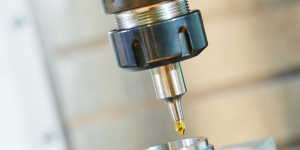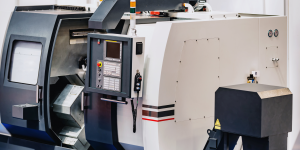Bien sûr, Voici un plan détaillé pour votre article de blog: L'industrie des soins de santé est devenue de plus en plus sur l'usinage CNC, ou l'usinage de contrôle numérique informatique en raison de sa précision, efficacité, et polyvalence. L'usinage CNC a non seulement révolutionné la fabrication de dispositifs médicaux et de prothèses, mais a également conduit à des outils chirurgicaux innovants. Dans cet article, Nous allons faire la lumière sur la justification de la popularité de l'usinage CNC dans l'industrie des soins de santé et de son influence sur l'amélioration des soins aux patients et des résultats du traitement.
Précision et exactitude:
L'industrie des soins de santé implique la précision et la précision comme les aspects fondamentaux de l'usinage CNC. La capacité des machines CNC à traiter des conceptions complexes avec une précision sans précédent change véritablement la donne.. Cette précision garantit les dispositifs médicaux, prothèses, et les outils chirurgicaux sont fabriqués selon des spécifications éliminant la marge d'erreur et améliorant ainsi la sécurité des patients. En outre, la précision de l'usinage CNC est un facteur important dans l'amélioration des résultats du traitement, car les professionnels de la santé peuvent être sûrs que les composants créés avec cette technologie seront toujours précis. La combinaison parfaite de précision et de précision dans l'usinage CNC révèle le rôle crucial qu'il joue dans l'avancement des technologies de santé ainsi que pour améliorer les normes pour les soins aux patients.

Personnalisation et personnalisation:
Dans l'industrie des soins de santé, La personnalisation et la personnalisation sont des aspects importants de l'usinage CNC car ils fournissent des solutions spécialisées aux besoins individuels des patients. La précision et le réglage des machines CNC permettent la fabrication d'implants, Des instruments chirurgicaux ainsi que des prothèses dentaires qui correspondent parfaitement aux besoins anatomiques individuels. Ce niveau de personnalisation améliore également le confort et la fonction du patient tout en contribuant à de meilleurs résultats de traitement. La spécificité des besoins du patient distingue l'usinage CNC en dehors des plus traditionnels, Signaler son importance dans le traitement de divers défis des soins de santé et la promotion des soins centrés sur le patient. En outre, La liaison transparente de la personnalisation et personnalisée dans l'usinage CNC est une manifestation qu'elle peut révolutionner à la création de solutions de santé modernes qui sont individualistes.
Prototypage et production rapides:
L'industrie des soins de santé profite grandement du prototypage rapide et de la production de l'usinage CNC, qui simplifie le processus de création de dispositifs médicaux, prothèses ainsi que des instruments chirurgicaux. L'utilisation des machines CNC permet un prototypage rapide de conceptions complexes, Permettre aux professionnels de la santé de tester et d'améliorer efficacement les itérations des produits. En outre, Les caractéristiques de production rapides de l'usinage CNC minimisent considérablement le délai de livraison pour un équipement médical vital qui est toujours nécessaire en temps opportun pour assurer la disponibilité des soins aux patients. La vitesse de cette méthode dans le prototypage et la production met en évidence l'effet révolutionnaire que l'usinage de CNC a eu sur la technologie de la technologie de santé progressive, Améliorer son accouchement aux patients.
Polyvalence matérielle et biocompatibilité:
En ce qui concerne l'usinage CNC pour les applications de soins de santé, La polyvalence dans le matériel et la biocompatibilité sont des considérations importantes. Machines CNC peut travailler avec une variété de matériaux, y compris les métaux, plastiques, et céramique; Par conséquent, les dispositifs médicaux et les implants sont fabriqués en fonction des besoins spécifiques de l'individu. Cette adaptabilité garantit que les matériaux utilisés sont biocompatibles avec le tissu humain, réduire la probabilité de réactions allergiques et augmenter la survie des implants. En outre, La capacité d'utiliser des matériaux biocompatibles met en évidence la contribution de l'usinage CNC à l'innovation médicale car elle permet la fabrication d'implants et d'appareils qui s'intègrent harmonieusement aux fonctions corporelles naturelles. Au carrefour de la flexibilité des matériaux et de la biocompatibilité dans l'usinage CNC se trouve son impact sur l'amélioration des résultats des patients pour promouvoir l'innovation au sein de la technologie des soins de santé.

Rentabilité et efficacité:
La rentabilité et l'efficacité sont deux des caractéristiques les plus importantes que possède l'usinage CNC., ce qui en fait un outil indispensable en santé. La réduction des coûts résultant des processus de production rationalisés et du gaspillage minimal de matériaux associé à l'usinage CNC profite aux établissements de santé, ainsi que les patients. En outre, le bon fonctionnement des machines CNC permet la livraison dans les délais des dispositifs médicaux, prothèses, et des outils chirurgicaux garantissant ainsi une prise en charge fluide des patients. Grâce à l'optimisation de l'utilisation des ressources et à l'amélioration des délais de production, L'usinage CNC montre sa capacité à fournir des solutions rentables qui augmentent l'efficacité opérationnelle dans le secteur de la santé, conduisant à de meilleurs résultats pour les patients ainsi qu'à une meilleure prestation des soins de santé..
Conclusion
L'usinage CNC a révolutionné la façon dont les dispositifs médicaux, implants, et les instruments sont conçus et fabriqués, et utilisé en raison de son adoption généralisée dans le domaine des soins de santé. Par la précision, personnalisation, polyvalence des matériaux pour le prototypage rapide, et la rentabilité de l'usinage CNC fait partie intégrante de l'amélioration des soins aux patients; repousser les limites de la technologie médicale tout en conduisant l'innovation dans les soins de santé. Avec l'avancement de la technologie, L'adoption de l'usinage CNC continuera d'innover les soins de santé, offrant ainsi de meilleurs résultats pour les patients et une meilleure qualité de vie.
